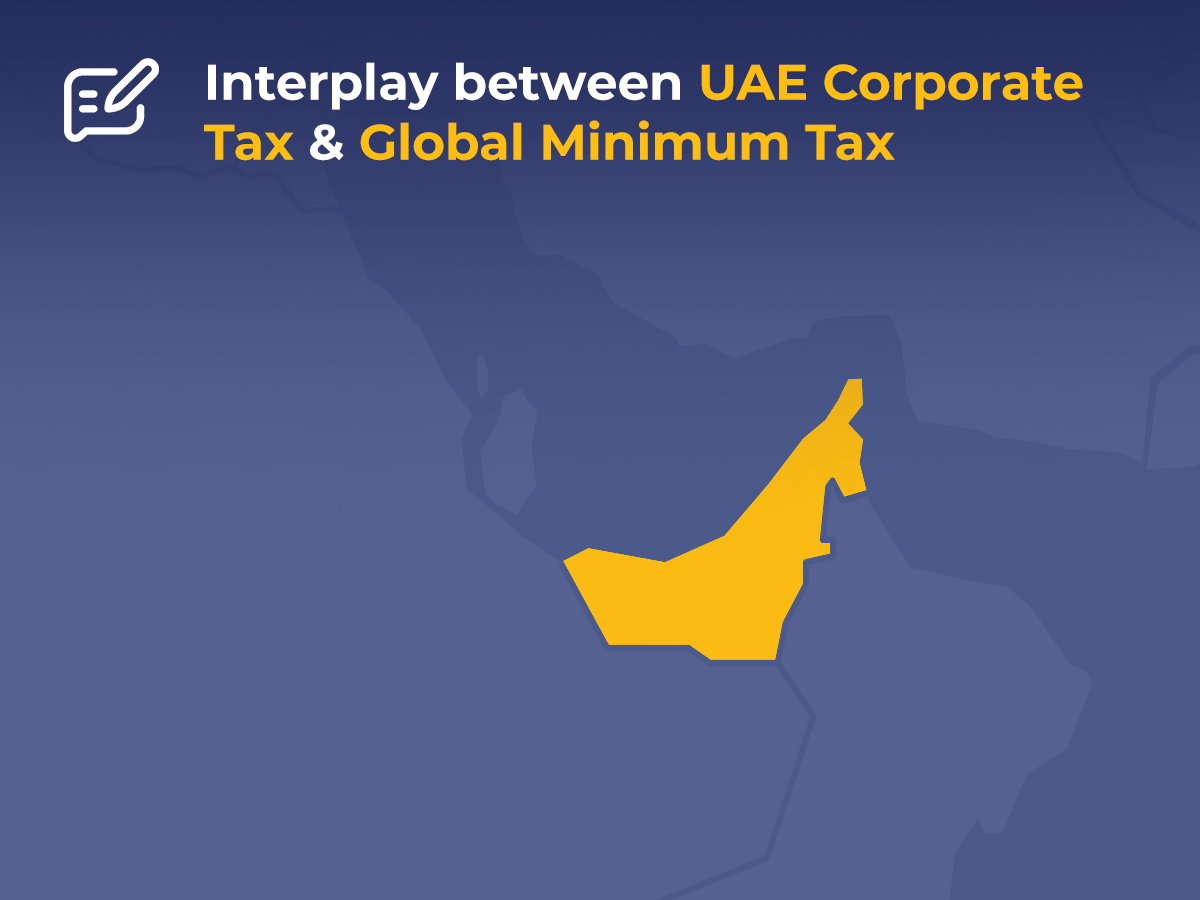Interplay between UAE Corporate Tax & Global Minimum Tax
December 23, 2022

Corporate Income Tax (CIT) in UAE is now a reality. With the publication of the law on 9 December 2022, there remains no doubt to state that the provisions of the law are progressive in nature and aligns with the global best practices.
Among the key provisions of the law, an important highlight shall be the 9% headline rate of tax, although specifically not prescribed in the law but confirmed in the Frequently Asked Questions (FAQs).
The 9% rate of tax remains competitive when compared to other countries in the Gulf Cooperation Council (GCC)[1] and leading economies of the world, large multinational enterprises (having consolidated annual turnover of more than Euro 750 million) could attract a different rate of tax (likely 15%) once the Framework concerning Global Minimum Tax (GMT) under Pillar 2 approach of the Organization of Economic Co-operation and Development (OECD) BEPS 2.0 project becomes effective around the world.
An attempt has been made in this article to discuss how the GMT Framework would interplay with the UAE’s CIT.
Background:
The genesis of the GMT Framework dates back to the 1990s when the concerns over ‘tax avoidance’ were raised by the European Union (EU) and largely by the OECD.
The concerns soon led to the investigations of the strategies adopted by the large multinational business to avoid taxes and culminated into 15 Reports (known as BEPS Action Plans), each report catering to specific observations and recommendations thereof.
BEPS Action Plan 1 (the Report) was among the 15 Reports, which addressed the tax challenges arising pursuant to Digital Economy.
Having regard to the complexities involved in determining the nexus in the transactions/businesses undertaken with the means of digital technologies, the Report was not made conclusive and thus, it only suggested a few measures as stop-gap tax arrangements.
Further works on the Report (commonly referred to as BEPS 2.0) leads us to Pillar 1 – focusing on reallocation to taxing right to user/market jurisdiction, and Pillar 2 – introducing the concept of GMT of 15%.
GMT – Broader mechanics[2]
GMT Framework lays out a complex set of rules, which ensures payment of tax at a minimum of 15% in all the jurisdictions/countries where the multinational enterprise group is present.
In case the effective tax rate (ETR) in any jurisdiction/country is below 15%, the mechanism shall ensure a top-up tax (to the extent of the difference) is paid in the jurisdiction/country where the parent or intermediate parent is tax resident.
Broadly, the implementation framework of GMT comprises (i) Domestic Legislation-based rules viz. Income Inclusion Rule (IIR) and Undertaxed Profits Rule (UTPR) supported by Switch Over Rule and (ii) Treaty-based rule in the name of Subject To Tax Rule (STTR).
GMT – Status of implementation outside UAE
GMT Framework was initially set for implementation at the beginning of January 2023, however, it has been realized that such a deadline could not be met due to administrative delays.
Nonetheless, it is worth noting that the United Kingdom has already published a draft of GMT legislation and Malaysia has already indicated to implementation of the GMT framework in its Pre-Budget Statement.
Further, Australia, Canada, Korea, and Japan have also shown their support towards the implementation of GMT and with the recent EU directive, it appears that GMT could be implemented as early as 1 January 2024.
GMT and UAE CIT – an interplay
UAE, being part of the BEPS Inclusive Framework of the OECD, is likely to progress on GMT in line with its global peers.
However, it is interesting to note that the UAE CIT Decree is silent on the implementation of the GMT Framework. The same is very briefly dealt with in the FAQs which state that UAE is committed to adopting GMT rules in near future and until such time, multinationals shall be subject to CIT under regular provisions of the CIT Decree.
With the awaited clarity around the implementation of the GMT Framework in UAE, it would be worth considering/debating whether UAE simply adopts the GMT rules as published by the OECD or it simply adopts a different rate of tax (i.e. 15%) in place of 9% for in-scope large enterprises operating in the UAE.
The matter also draws importance since it is also indicated that a 0% rate benefit for Qualifying Free Zone Persons could also be affected in case such an entity is part of in-scope large enterprises.
[1] with an exception of Bahrain, which does not levy any corporate income tax to date.
[2] Covers only the overview of the top-up tax mechanism without discussing the technical aspects which are complex in nature








